#a far more moral character than Thor (at the start of Thor's arc) and Odin. and a lot of culturally Asgardian ideas
Text
not a fan of people saying Odin and Loki are similar in a moral or decisive sense, particularly when it comes to Thor. that makes it sound like Loki doesn't know Thor or care about him beyond what he symbolises (regarding Asgard/the throne/family/worthiness), when that's a defining part of their relationship
#like i get WHY people go 'oh Thor is like Frigga (they care™/bring Emotions in) and Loki is like Odin (calculating™ /For The Greater Good)'#but if you make such a clearcut comparison you neglect a lot of stuff that Odin and Loki do drastically different#like there are literal contrasts that are pretty evident around Thor particularly#like Odin does expect Thor to be some ideal version of himself that obeys Odin implicitly and doesn't have his own volatile emotions?#while Loki more sees that Thor isn't who he tries to pretend to be and generally encourages Thor to realize that#the most obvious parallel would be how they in TDW try telling Thor that Jane won't work out#and Odin goes for the whole 'well they're insignificant' angle despite Thor caring about the humans and Jane particularly#Odin tries to go 'here's Sif and since you shouldn't have your own preferences (they're wrong and bad) consider my choice'#he largely disregards Thor's emotions#most people do on Asgard????#like it's literally wild how everyone saw Thor being major depressed and they basically told him to pretend to cheer up#like im sorry Thor's grief means nothing to y;all. he fell in love with someone very mortal and his brother is changed forever#Loki tries putting Thor off by first off. Thor KNOWS Jane isn't going to live long he's not never thought about it#he doesn't even make the decision for Thor he tells him to consider his choice well bc it WILL hurt him when she's gone#Loki is like treats Thor like a person and Odin is like nah I own him#I feel like in converting the brother/father relationship difference over people lose the differences in those aspect#they skip to similarities of heartlessness and Machiavellian ends meeting the means when Loki overall is#a far more moral character than Thor (at the start of Thor's arc) and Odin. and a lot of culturally Asgardian ideas#that's literally part of Loki's original characterization that he DIDN'T match up with their views#he didn't do stuff like take killing lightly like it's for fun and that's one of a long list of obvious aspects that make the setup cool#don't tell me Odin and Loki are the same#like there's some blanket understanding that Loki doesn't show or care about the people he loves#while Thor and Frigga have always been softhearted and refused to sacrifice themselves for what is deemed better for everyone#don't mistake selfishness for apathy and don't say Loki didn't cry himself through the first movie because duty to the throne comes first#that's literally Thor's bit#idk
105 notes
·
View notes
Text
Why does the Loki series divide us so much?
Why are there people who are amazed by Loki’s character development in the series and some who can’t find any of it when they watch it? Why are some people mad about the ‘out of character’ behavior and some argue this had always been his ‘true’ characterization that was just buried under the hate and trauma during the earlier movies. And why are there people who want the Avengers Loki, when he was at his most hateful and worst in that movie when they could have a happy Loki who finally got friends? I have read all those takes and questions over the last weeks and it led me to the question: how do we perceive the Loki series so differently?
Answer: it is because of the structure and how it collides with pre-existent mindsets!
Ok, I admit that sounds very abstract so here the clear text: the Loki series is structured as a redemption arc and that only works if you think he needs to be redeemed.
This is the redemption arc from the series:
Episode 1 reminded us of Loki’s bad deeds. He killed his mother* by sending the dark elf prisoner up the stairs to the right. He betrayed Odin, Thor, and Asgard*, and literally stabbed people in the back like 50 times. Also, he still thinks he should have a throne.
To drive this point home and to remind u how far our Loki has come, the other Loki variants in episode 5 are as power-hungry, focused on their glorious purpose which is an expression of their innate narcissism and belief in their superiority.
But back to Episode 1: ‘Our’ Loki variant gets his own evilness demonstrated by Mobius, who acts as a savior and a friend. Unlike everyone before, he believes in Loki and that he can be better! Loki admits that his evilness results from his weakness since he only wants to inspire fear to appear strong. After being honest with him, Loki can befriend Mobius and together they solve the mystery where ‘the variant’ hides.
But despite his glimpse into self-discovery, Loki is still selfish and power-hungry. He might have gotten the first push thanks to Mobius but he didn’t change yet, and so he betrays Mobius like it is his nature. He wants to team up with Sylvie, and together they can bring down the timekeepers. Then Loki would probably betray her, too, and become ruler of the TVA.
Now he gets to know Sylvie, and most of all the fact that sets her apart from all the other variants: she doesn’t want to rule! She only wants to end the reign of terror. Her selflessness reaches Loki and he starts to change as well. He realizes there is more to life than a throne. (The romance part is mostly to drive the point home and give him additional motivation. Also, the rule of show business is: turmoil is good, it will attract more people.)
Her selflessness is why Loki joins her cause. Even after being pruned, he wants to aid her. His second-hand embarrassment of the power struggle among all his variants shows US how much our Loki has developed, since he doesn’t even want to rule himself anymore, and HIM that he never wants to go back to his former self.
@alwaysanoriginal pointed out on Twitter that it is Mobius’s influence that makes the classic Loki discover that same selflessness in himself so his sacrifice allows Loki and Sylvie to overcome Alioth and enter the world beyond. Sidenote: I recommend their meta! It’s full of positivity, detailed, and well worded! (Also, we reached the point where the series is while I am writing this, so what follows is speculation based on what I wrote up to here.)
Now, in the finale, Loki’s character development has to be tested. The narrative will tempt him to betray Sylvie to get what he always wanted: power, admiration, being the one who holds all power in his hands. The villain however will be a Loki variant who combines all the worst characteristics: the Loki will be a narcissist, power-hungry, lying, using everyone for his own personal gain etc…
Our Loki will be tempted hard (because that will have us at the edge of our seats) but at the last moment, he will realize that he doesn’t want to be this kind of person anymore. He will stay true to the oath he swore when Sylvie and he snuggled beneath his table cloth. And then Loki will finally be the hero Mobius always believed he could be.
Now, if you are enjoying the Loki series this read feels probably good for you. Now comes the other side of the coin that explains why people don't enjoy this plot:
To make this structure work, they changed Loki’s motivation retrospectively (or they didn’t realize the former films indeed did give him an honorable motivation):
- In Thor 1, Thor was shown as unfit to rule so Loki wanted to delay his coronation and give Thor time to develop work morals (which worked. At the end of the film Thor was a better person). After Loki’s origin was revealed he wanted to prove himself to Odin by the only sufficient method he was communicated: genocide. Now, his motivation is lust for power and narcism.
- in Avengers he was influenced and/or tortured by Thanos (confirmed by Marvel). Now his motivation is lust for power and narcism.
- In TDW, he acts honorable until the incident that can be either seen as Loki sacrificing himself for Thor or betraying him. With the updated characterization from the series, his motivation is now lust for power and narcism.
- in Thor Ragnarok, Loki didn’t do much that would need motivation. What little motivation was needed to turn up for the final battle is probably still Thor pointing out what a selfish and predictable person Loki was, so I guess the only change that happened here is that it might have been defiance caused by his narcism that made Loki turn back to Asgard. So the characterization from the series fits that from Ragnarok best.
So, I don’t have much more to say. All other problems I have with the series originate from this problem.
1) Characterization: They couldn’t show him as badass or in control in the beginning because that would have put his ‘bad’ characterization in a positive light. Therefore, they had to make him a clown. (Note: President Loki who is still a villain still has the badass, thirst-inducing, awesome characterization of the Avengers Loki.)
2) Sylvie does all the heavy lifting (aka the plot so far would have worked without our Loki just as well): well, unlike him, she is a good person already, so she has the motivation for all those things. The only points where he is active are when his ‘evil’ nature takes the wheel, and he wants to meet the timekeepers (motivation to find Sylvie’s hideout) or to team up against the timekeepers (motivation to chase after her and betray Mobius).
3) the representation of being genderfluid would have needed either Loki or Sylvie to change the gender they presented during the series. But the creators needed the male/female dichotomy as an outward representation of selfishness/selflessness so the representation of genderfluidity remained empty lip service.
I’m tagging a few people because I would like to know what you think about this analysis: @iamanartichoke, @worstloki, @iamnmbr3, @allaboutloki, @crazyaboutloki.
153 notes
·
View notes
Text
A Vikingr Saga for the Ages
Ever since the first game in the franchise, I was enraptured by the idea of stalking my prey on the rooftops of Renaissance Italy and then leaping down - slaying them with a flourish. I didn’t know it yet but the marriage between history and stealthy parkour had me hooked from the very first trailer for Assassin’s Creed. When the series pivoted towards mythology and set further in history than ever before, I eagerly followed. From Ptolemaic Egypt to Ancient Greece. It should come as no surprise that I devoured, then, that I devoured as much of the world that I could in the latest entry: Assassin’s Creed: Valhalla. And after clocking in just under 150 hours, there is much for me to unpack in Ubisoft’s latest entry into the Assassin’s Creed franchise. That, and a fierce desire to finally start watching Vikings.
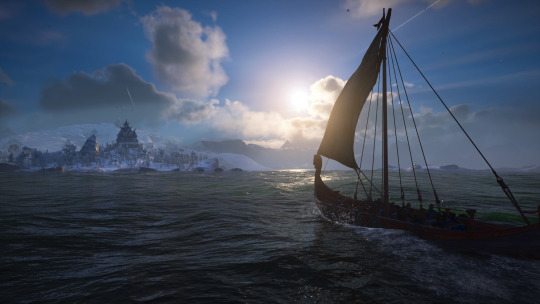
When I initially booted up Assassin’s Creed: Valhalla (AC:V), I will admit that I was a little disappointed with the control scheme. Once again, Ubisoft had made it a confusing mess with trigger buttons instead of face buttons used to attack. Since I had just come from Spider-Man: Miles Morales, it took a good long while for me to adjust. Several hours later, after fumbling through my first battle with a lost drengr (I actually dumbed down the difficulty a litte), I finally managed to find my footing and was on my way to England to scrape out a place for the Raven Clan.
As for stealth...well, the less said about it the better. I never found it effective. It was much easier to smash my way through, axe in hand (or greatsword) and lay waste to their paltry resistance with a mixture of heavy attacks and parrying. I also, hardly used the bow (one of my favourite weapons to being stealthy in Origins and Odyssey).
The story in AC: V is a little messy. Most of it is done through a separate arcs for each territory Eivor ventures through: from East Anglia to Snotinghamscire, with little to link it all together except the main character. Were it not for the very loose story threat surrounding Sigurd and the conquering of Mercia to establish a firm foothold in this new land of England, many of the storylines could be regarded as standalone adventures in Eivor’s epic saga of conquest.
That doesn’t, of course, mean it’s bad. Merely disjointed. Particularly when I went from Jorvik and its Yule Tide celebrations to Glowecestrescire that was right in the midst of Samhain right after each other. Did I go back in time? Or did almost an entire year fly past Eivor with none the wiser?
Still, even though they were mostly standalone storylines, I still very much liked all the characters I met along the way. My favourites were the earnest Hunwald, noble Ceolbert (his death was almost as bad as all the horse deaths I’ve encountered in video games) and fun-loving Twydwr (particularly when he and Eivor were drunk, and messing with the local chickens) On the Norse side, I very much enjoyed the banter between Eivor and her childhood friend Vili. But the one that I admisted most was Soma. She was the jarlskona of Grantebridgescire - the first place I explored after landing in England. And one, I hoped I could romance to some degree. Alas, my hopes were dashed on that end.
What I did find a little intriguing were how Sigurd and Eivor were sages for the Isus: Odin and Tyr. And in their little Raven Clan, revealed much later, was also Freyr. It seemed strange that so many of the reincarnated Isu were all incredibly close at hand.

In this title, Ubisoft was able to focus again a little more on their complex lore that was seeded throughout the first few games. And while some questions were answered, it still left plenty of mysteries of where the games go from here - particularly from a modern-day standpoint. Though I am reluctant to see the franchise go, it does feel like Ubisoft is finally coming to a close on the grand story that they are trying to tell. What the end result turns out to be is still to be determined, but more emphasis needs to be focused on the central conflict.
For a game that still has Assassin’s Creed in the title, Eivor’s connection with the order and their enemies seemed very tangential. While I killed many Order of the Ancient members, there was no sense of personal investiture, like, say with Ezio’s quest. The only ones that I felt motivated to put an end to were Fulke and Kjotve the Cruel. Unfortunately, all the build-up in the first scenes with Eivor were quickly resolves within the first two to three hours of the game, and Fulke’s arc was all but over in the half-way point.
I suppose the main reason for my discontent with the narrative of AC: V is the fact that there is no Big Bad for Eivor and her Raven Clan. Yes, Aelfred of Wessex is a ‘villain’ that hinders our protagonist, but he never felt like an oppressive threat.
Basim’s reveal, somewhat late in the game, was also a little underwhelming. Yes, he did look an awful lot like Loki, but how did he manage to get to Norway? He hadn’t accompanied Sigurd and Eivor. Did he travel with a third party? How did he know that Sigurd and Eivor would be in the ruins of an Isu temple? So many questions, so little time.
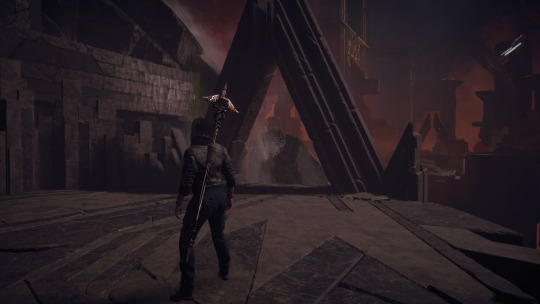
Then there was the whole ‘Heir of Memories’ and the fact that Layla seemed so worn. After finishing Assassin’s Creed: Odyssey, my last impression of her was receiving the Staff of Hermes Trismegistus from Kassandra and being hopeful for the future. Fast forward to AC: V and Layla is tired. The world is on the edge of destruction once again and she’s now paired up with married couple: Rebecca Crane and Shaun Hastings (the two last appearing undercover in Assassin’s Creed IV: Black Flag).
On a side note, why are their adventures all done in the comics or some other media? AND WHY DO I NOT HAVE ACCESS TO ANY OF THIS?
And because I didn’t play the expansions for Assassin’s Creed: Odyssey, I knew too little regarding the modern-day struggles with Layla. In fact, I basically resorted to the Assassin’s Creed wiki to bring me up to date. Honestly, DLC should never be story-related. Or, if it is, should be more tangential rather than major. It’s a terrible practice that quite a few publishers do, and which leaves players such as myself playing catch-up.
The only one that landed with any oomph (at least for me) were the Asgard and Jotunheim arcs. These were connected and told the story of Havi as he struggled to find a way to avert his fate. The final battle also proved challenging and climactic. A far cry from the ‘endings’ that the main story provided. In all honesty, I probably should have left that to last while completing everything else first. But the temptation was too great and I was vastly overlevelled.
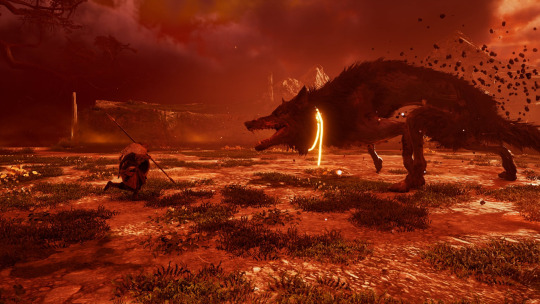
I also enjoyed the play on the Norse myths. The only downside with the Builder was that there was no horse to help him. And so, there was no sexy mare Loki to tempt away the Builder’s horse - giving birth to Sleipnir. The other stuff, though, was clever. And I liked the references made to other myths, such as fighting against ‘old age’ and Thrym’s disastrous marriage to ‘Thor dressed as Freyr.’
What was also a little odd, at least for me, was that there was no definitive part where the credits rolled. Much like in Assassin’s Creed: Odyssey and Assassin’s Creedy: Origins. Personally, I hate it. Credits give closure and tell gamers that the narrative that they were pursuing has come to an end. It lets me reflect on everything that I experienced and is an indication that I can finally set the controller down.
Assassin’s Creed: Valhalla also came with its fair share of bugs and glitches. Many, after reading up on them, made me frightened to continue. One, in particular, took me a while to figure out an alternative to: entering Lunden. I didn’t help that the more I read, the more I worried about encountering a game-breaking bug. Thankfully, most were simply treasure hoards not loading, late texture pop-ins that were a little frightening, and the drunk Eivor every time I loaded up the game.
Despite its many faults, I still very much enjoyed my time roaming around England, Vinland and Norway as I worked to build up Eivor’s reputation and to ensure her name would be sung for ages to come. Like a true Vikingr, I played copious amounts of orlog, drank mead and tore up the battlefield to create a home for my people.
Even better, at Gunnar’s wedding, I managed to finally woo Randvi (who I abstained from bedding down with earlier on in the game)! That, perhaps, elevated the game for me and I can be happy knowing that all my hard work paid off.
(As an additional aside, I also love how many of the side quests or ‘mysteries’ in AC: Valhalla made references to popular culture. From Winnie the Pooh to Alice in Wonderland. AND ROBIN HOOD! THE NPC CALLED LITTLE JOHN HAD ME GUFFAWING!)
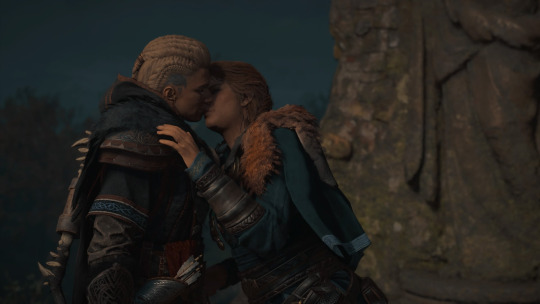
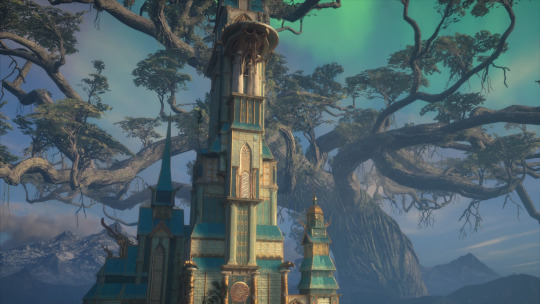
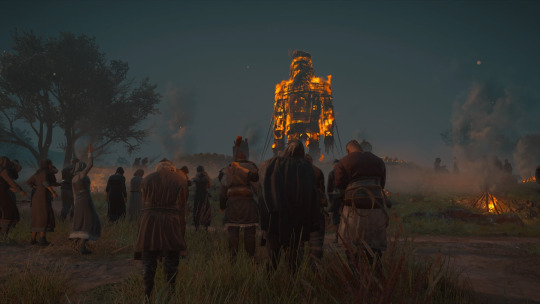
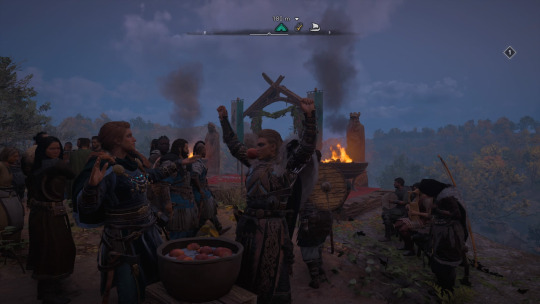
12 notes
·
View notes
Text
Another Thor speculation ramble
Yeah, been doing a lot of these uber geeky Thor speculation posts lately, but keep coming across stuff that makes me go hmmmm
So, was doing my occasional catchup on Twitter (I don't use it much, mainly just use it to lurk and follow what some creators are saying) and came across this: https://twitter.com/Doncates/status/1421534363192279047 and also https://twitter.com/Doncates/status/1421611974169825281 from the same thread. Intriguing!
And first of all, these tweets are vindicating, because I have been saying forever that 'worthy' doesn't mean being a pinnacle of morality and goodness, like some people seem to think it means. 'Worthy' is a neutral word and can mean different things based on context, literally anything the person dictating the terms wants it to mean, it is not synonymous with 'good'. In the context of Thor, we aren't entirely sure WHAT it means. We do know, after Aaron's run, that knowing you fall short of what's expected of being a good god, but trying to meet those expectations anyway, is at least part of it. But we don't know for sure if this 'be better' the wielder strives for is self defined or not. If self defined... yeah, it could be warped to be something bad. But that's clearly not all of it, or more people would have been able to lift it. Lots of people out there who could lift it if it was JUST that. The other requirements may not necessarily be good, or bad, but maybe something that reflects Asgardian culture, or something, we just don't know for sure. We aren't even sure any more if the worthiness qualifications are determined by Odin or the Mother Storm. This is one of the reasons that, even before the enchantment apparently broke, I thought Loki had a good chance of wielding it. Not the Loki of the past, but the current Loki is all about self improvement, and knowing he doesn't live up to expectations, but he's trying to. (not always successfully, he's got a lot of bad habits, but he's trying)
But on the subject of Loki, the second tweet is a bit ominous, for sure. And I may have to adjust some of my previous speculation, (TLDR, I think Loki is the next 'Champion', Thor's replacement, as all of Asgard shifts roles between characters, click the link for an explanation as to why) but not by a ton, really. I know some people would see that tweet, and take Loki lifting it as the 'terrifying' prospect. But it doesn't have to mean anything bad about Loki's face turn status (I really want the face turn to stick, I am invested in this direction for him), because Cates has already teased a far worse future for the hammer. I think this is more of a Thanos tease than a Loki tease.
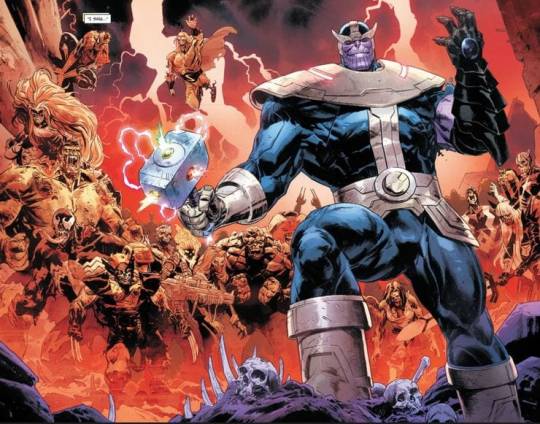
My guess is, Loki will get the hammer, for a little while, as well as Thor's old role. But the role is not defined by being worthy of Mjolnir, it's more about the function they fill in the narrative. You can have the role without having the hammer. The Champion role predates the hammer by generations, and at least in the case of Sigurd, we know he had his own signature weapon, Gram, so it is entirely likely that Loki will get his own signature weapon as well. In fact, I would prefer this, since whacking things with a hammer really is not his style. He needs a sword, daggers, maybe a magical staff. Just something that plays to his abilities and style of doing things. It's just that the hammer has become associated with the role while Thor was in it, since he had used it as his primary weapon/worthiness gauge for most of his time in the role. But not all of it, he had Jarnbjorn in the beginning, which apparently first belonged to the valkyrie, Runa, who might have been the Champion after Sigurd, so it could make good sense for the Champion to use the weapon of a previous role holder until they get their own signature weapon. So I think in universe, the initial thought would be that the wielder of the hammer has the role, because that's how it's been for a thousand years. But they'd actually be mistaken, because the point of the great role shift is to update the roles, not just become a carbon copy of the person who was in the role before, otherwise there is not much point in the periodic shift of roles. So it makes sense that the new Champion would get a new weapon, and not just inherit Mjolnir, but I was envisioning a sort of transition period, to kind of ease everyone into things. I thought with all the Mjolnir stuff, he would get it at least for a little while, at last until he can prove himself. But... maybe not? These tweets make me less certain of the Mjolnir part, even though I do still feel Loki is getting the role, and will continue to be a good(ish) boy. It may be that Mjolnir has to be destroyed in order to prevent the bad future with Thanos, which would symbolically also make the role his own as a new weapon is created for him.
And while on the subject of Donny Cates' tweets: https://twitter.com/Doncates/status/1421898562275880960
Heh, so I guess Thor and/or Loki is going to Midgard and having a hotdog. I kinda hope together, so they can disagree and argue about best condiments. I dunno about Thor, but I do know Loki had a hot dog with Spider-Man once, and it involved 'green bits' so i presume it had relish. But lately he seems to have taken to mustard. So he appears to just go with his favourite colours.

Unrelated to the above, I had a random thought the other day, about the whole situation with Throg. It's not speculation, I have no idea if they will do something like this, it's just something i think could be fun. So, let's say Throg does end up trying to be sort of a mentor to Loki, I got to thinking that you know, Thori is probably bored as hell sitting around Asgard all day, he's a dog of action and violence, not a house dog. And he WAS Loki's dog to start with, so.... Thori could join Loki too as another animal companion. And then, I got to thinking that Thor would probably want to back seat drive, and he'd probably do that via Hugin and/or Munin, giving Loki a third animal companion. I just think it would be funny. And, of course, if this happens, at some point Loki has to shapeshift into an alligator. obviously.
Also, I realized today that next year is the 70th anniversary of Journey Into Mystery. A good time for a relaunch, no? It might be a bit later than I would personally like, I'm missing having a Loki solo story to follow in the comics, but it would seem to line up with where the solicits are going. The issue with Throg, 18, comes out in October. Then if we assume the arc where, presumably, the new status quo with the new Champion is laid out starts in issue 19, and likely goes for around 6 issues, then around March or so, they may have things set up for a JIM relaunch. Then Thor can focus on Thor, and Loki can go do his thing in JIM, and everyone wins. Again, this is not so much speculation as something I think could work, but it does seem to line up nicely.
2 notes
·
View notes
Text
“Lemma the Librarian - Sucker for a Good Book”
Published: January 30, 2016
http://www.mcstories.com/LemmaTheLibrarian/index.html
For a story in which the bad guy kills like fifty people (off-camera), this one is a lot more fun than its nobody-dies predecessor.
It helps that it opens with a wonderful comic setpiece, Lemma attempting to play damsel-in-distress/bait, very, very badly, followed by some nice Lemma/Iason banter. They’ve actually reached the point where they seem like a pair of (rather snarky) friends. The return of Brea (moderate squee) also helps with this: it’s a callback to where they’ve been already, of course, but also reminds us that Lemma is capable of making friends, and has been doing so rather better since the story started. Another step on her character arc.
The last two thirds of it is a straight-up dungeon crawl, always a fun fantasy trope (and one Lemma doesn’t do elsewhere). The “you can’t resist mind control” curse starts to pull its weight here, since Lemma really, really doesn’t want to be eaten by vampires*, but she loses fast anyways. Brea shows up, Lemma mind-controls her - first time for everything - and then we have a climactic fight where Iason, Brea, and Lemma all play a part in saving the day**.
Then Iason gets to explain to Lemma, for once, which is as funny as it is infuriating to Lemma, Brea takes the whole being enslaved thing surprisingly in stride once it wears off, and Lemma realizes that Brea touched the super-powerful doombook without harm***. Lemma’s theory is that Brea is an avatar of the war goddess(es), come to help them undefile her/their temple, which is great, but I like Brea’s character enough on its own terms that my theory is a little more hands-off: Brea’s Brea, just (possibly even unbeknownst to her) getting a blessing from the war goddess(es) to help her be the hero she wants to be (and undefile the temple). It’s a pretty great ending****.
*Unlike the other mc bits, where Lemma merely partially doesn’t want to be controlled. More on this, later, too.
**Given that only Iason isn’t under mind-control by the villain, that must have been a bitch to plot. It works well.
***Also threw Iason’s sword without trouble, although this is less impressive than it sounds. As in D&D, magic here apparently doesn’t leave much time for pushups: real iron swords weigh substantially less than any one of the books that Lemma’s toting around, assuming the books are parchment rather than paper. You gotta be able to swing that sucker fast, after all.
****Spoilers: yes, I know. *grinds teeth unhappily* We’ll get to... that... when we get to it, OK?
When The Fuck Are We? 🤷
We’re in the capital of Mercia, which means, I guess... (*googles around*) Tamworth, Staffordshire? Sure*.
This is the first story to really directly touch on religion: the Tin Islanders (and Sea Peoples, and Lemurians) are polytheistic, which is not really a stretch when you have documented cases of gods walking the earth. The Tin Islanders have a Triple Goddess of War, which of course suggests the Morrigan, the Irish Triple Goddess of War/heavily war-inflected Three Fates figure.
Ireland was both the longest surviving Celtic-cultured region in Britain, and the one where the pre-Christian mythology was recorded most thoroughly, so most of our knowledge of British Celtic mythology is really Irish Celtic mythology. This isn’t a huge problem - if the Irish had a Morrigan figure, then it’s not a huge stretch to imagine that the Great British Celts did too. The problem is that we’re in Mercia, ie the Anglo-Saxon half of the island, and the Anglo-Saxons had their own mythology, which was completely different***. Also, just to kick the timeline while its down, the Briton half of the island - Kyrno and Breizh, in particular - should still be Christian in 650 CE, and within a generation so will most of the Anglo-Saxon half, including Mercia.
No Fantasy Christianity is, of course, a pretty common thing, and for perfectly valid reasons (it makes it hard to have morally-neutral magic, for starters, and that’s not even getting to the list of cultural issues as long as my arm that it imports****). But it makes the Seven Kingdoms/Heptarchy equivalence a bit hard to hold on to. Mercia, until the second half of the 7th C CE, was practically defined by being the last and by far strongest pagan state on a Christianizing island; and after that was occupied with the vicious squabbling with the Church that was the birthright of every Christian state down to at least 1648.
Religion in the Dark Ages was serious business, is my point. The Tin Islanders seem to have a vastly more laid-back approach to religion (we’ll be seeing a great example of that next time), which fits the more syncretic approach of classical and pre-classical Europe. Plus, of course, before the Romans and Anglo-Saxons came, Britain was uniformly Celtic and presumably uniformly Celtic-religioned. So from the religious point of view, at least, 1200 BCE seems like it might be a more plausible date for the Tin Islands.
*Dark Ages polities tended not to have “capitals”, in favour of itinerant courts, since the infrastructure to maintain central control over large areas didn’t exist anymore, and perpetual travel was the only way to keep a handle on all the outlying parts. (Or really, every part was outlying.) Tamworth is just one of the more important Mercian royal residences, probably near the original 6th C core of proto-Mercia. They did have capitals in the relatively centralized late Bronze Age, though, so I’ll take advantage of the bouncing back-and-forth timeframe again to give it an ok**.
**Relatively centralized in the Eastern Med, not distant Britain. Damnit, I’m trying as hard as I can, OK? :P
***We don’t know a huge amount about Anglo-Saxon religion, actually, for the same reason we don’t know a lot about the religion of Celtic Great Britain (to wit: the Dark Ages lost a lot of recorded knowledge, and the fine details of pagan religion was one of the things Dark Age Christians were mostly not interested in preserving). But we do know enough that “eh, Viking stuff with Odin and Thor and whatnot” covers it to a reasonable first approximation, at least as well as “eh, Irish stuff with fairies and the Morrigan and whatnot” does for the pre-Christian Celts.
****For instance: the use of the word “soul” in this series also seems very un- or at least a-Christian. It seems to be more of a synonym for “will and personality” than “immortal essence of the person themself”. There’s never even any particular reference to an afterlife, that I can recall. Lemma and Iason are horrified about their vampiric bodies wandering around being evil without “them”, but possibly not as much about the soul being destroyed. My feeling is that in Lemma’s cosmology, after death the soul slowly unstitches itself and returns to the totality of the universe or some such new-agey thing; having one’s soul destroyed is very, very bad but not anything like what that would entail in a Christian cosmology.
~
Next time: The most sympathetic Lovecraftian cultist I have ever met. No, wait, there’s “The Litany of Earth”. Go read that while you’re waiting for the next review. You won’t regret it.
3 notes
·
View notes
Text
So I finally finished rewatching Thor (my laptop doesn’t like playing a movie after a day’s work) and tbh it’s interesting to think of how my interpretation of Loki’s situation has gone over the years.
When I first saw that movie, honestly, I was not only 100 % on Loki’s side, it was simply impossible for me to like Thor, or Odin, or basically anyone else in the movie no matter how badass they were (sorry, Sif). I was in a pretty bad place that winter and Loki’s emotional position struck me as so deeply relatable it hurts...which kind of showed, since I wrote 80 fics featuring (and, often, starring) Loki out of, at the time, something like 115 stories1.
After a while and some navigating through the Thor vs Loki fans/stans wars on Tumblr, it kind of evolved into thinking that yes, Loki’s feelings of hurt and betrayal were real, but since his family loved him he should just work on his own insecurities and get over it, so to speak. The part where Loki was a Frost Giant and how that put Odin’s actions in a different light (whether you assume Odin’s reactions to Loki were 100 % conscious or not) was...pushed aside, sort of. I think it was in part because you can hardly reconcile ‘Loki, this is on you, get over it’ and ‘maybe your parents didn’t really treat you as you needed and maybe it’s in part due to your species and their racism’.
The funny bit is, how I view Loki’s situation seems to be tied to how I interpret my own, actually. Back in 2011, I was very angry toward my family and half convinced they didn’t love me (fun times, in case you were wondering). By 2012, when Avengers came out, I’d fantasized so much about Loki coming back and getting the apologies he needed (from his parents, from his brother, from basically anyone in his life) listening to Thor’s jokes about how Loki was adopted physically hurt. I can’t say that raised the character in my esteem, but at the same time, looking back on it...well, it’s kind of a realistic continuation of Thor. I mean, by the end of that movie no one seems to question Odin’s decisions, no one seems to consider maybe there were things that led to this state of affair in the family besides Loki’s own character/judgment flaws.
At the time, if I recall correctly, that kind of felt like a slap to the face. It didn’t entirely prevent me from enjoying the movie, but I still couldn’t help but feel it was one more way to remind me the public that I Loki was making it all up and needed to shut up because my his family loved me him and therefore not being satisfied with that was, in essence, a character flaw.
In The Dark World, Loki gets punished for what he did in Thor and The Avengers which, lbr he deserves (though full disclosure, I subscribe to the manipulation and psychological abuse at the hand of Thanos theory, so I’m less on board for punishing him for that2). Once again though, there is no questioning of other people’s behavior around him. Frigga basically tells him he’s too self-centered/a bit of a hypocrite, people who supposedly mourned for him3 line up to issue death threats...once again, it’s all on him and his core flaw of not being happy with what makes other people happy. And once again, I thought maybe Loki ought to just get over himself and be happy with things as they were. 2013 was a bit of a better year for me4 so in a sense, it was easier to think that maybe, if I just got it through my head that my family loved me, I’d finally be happy and feel content with myself...which in turn made it easier to accept, again, that Loki was probably just a lost cause and should get over himself.
And then came Ragnarok.
I haven’t really made it a secret that I was disappointed by it, in significant parts because the humor trend of ‘let’s ridicule our character’ was taken way further than what I expected from this franchise and strayed waaaay away from the tone of the previous two movies5. But with a little more time to think about it, I think anther significant part of my disappointment with this move is that, once again, I didn’t get the emotional conclusion I was hoping for. I’m no longer in the same emotional state as I was in 2011, but I’ve also let go of the ‘you should get over it’ mindset, both for myself and for Loki. I’ve said it before but it bears repeating: how I view Loki’s situation is heavily influenced by how I process mine and vice-versa. The result of that is, as I allowed myself to feel hurt/wronged by the way my family acted around me again, it kind of allowed me to start wishing for...idk, balance? A satisfying end to my emotional arc? And to wish the same thing for Loki.
Thor: Ragnarok was...a painful, but probably realistic reminder that this will probably never happen. Beyond the fact that both Frigga and Odin are now dead and are therefore incapable of evolving in any capacity, I highly doubt Thor is ever going to wake up and realize what it’s like to be in Loki’s shoes, which would be a requirement for him to realize what kind of apology Loki needs to hear and why. Similarly, I highly doubt my family is ever going to wake up and apologize for the way they reacted to how they and I were different and how much that hurt, sometimes.
The common point here is Thor, like my fam, did nothing wrong by the social standards he’s accustomed to. I doubt Asgard sees dismissing un-warrior-like behavior as wrong, I doubt they see asserting your alpha male authority by telling others to shut up as wrong, and I doubt they see the constant mocking and belittling of Frost Giants as wrong...so for Thor to admit doing these things are wrong and hurtful would require him to admit not only that he has been hurting someone he cares about by accident but also that the entire moral landscape he (and his country) based his worldview on is flawed, which is complicated and painful and which Thor hasn’t shown any sign of doing so far, and neither has my family6
From there, the logical conclusion is that the moment of emotional justice I crave for both myself and Loki will most likely never happen. I don’t think there’s ever going to be a moment when Thor looks Loki in the eyes and says ‘I didn’t mean to, but I hurt you anyway, I get how, I’m sorry, and I’m not gonna do it again’. I don’t know how they’ll deal with that in the movies, if they’ll keep this craving as part of Loki’s characterization or if they’ll eventually reach a point where Loki is just a-okay with his situation even without the emotional closure7 but either way, it’s not going to happen for Loki, and it’s probably not going to happen to me either and that is...something I have trouble mourning, I guess. Which, well. There’s always fics, and things I could write myself, but it’s not exactly the same thing, is it?
I’m doing a rough estimate of my cumulated AO3+FFN count of the time here. Might get it wrong.
Also for what it’s worth I think it’s super fucked up (though utterly unsurprising) how the entire franchise dropped Loki’s frost-giant-ness and how that probably influenced the way Odin (and, consequently, everyone else) treated him, not to mention the hot mess that is his decision to exterminate all Frost Giants only after he discovers he is one.
Not very long if we got by the ending of Thor but, you know. Let’s pretend they did. (Also I acknowledge that, post Thor, they have rock solid reason to assume he’d be capable of attempting murder on Thor and to distrust him in general. I guess I just feel like they mourned their supposed friendship with him really fast).
Shoutout to my tumblr friends and to the awesome Winnie for helping me through so much bullshit.
The most frustrating part of that is that there are many things to like in this movie, from the criticism of Asgard’s imperialism and the whole ‘benevolent conqueror’ narrative that’s been the baseline from Thor and was criticized even then, to the fact that Ragnarok!Loki is probably the closest we’ve seen to the real Loki (given that it’s the first movie where he didn’t start out in the middle of an emotional crisis). Unfortunately for me, the way they were conveyed didn’t jam with my hopes/expectations for the movie.
I never pretended this wasn’t a personal post ^^’
To be honest, what I’ve heard about Loki in Infinity Wars so far kind of makes me fear a relapse, but I’m hoping they’re just planting red herrings. Hopefully.
#my posts#matt has a life#matt watches#mcu#loki#thor#thor's first#What were you the god of again#spoilers#ragnarok spoilers#where is my oversized male ego#my meta#mcu meta#this is half meta half personal tbh#replying to it purely on meta levels is ok though
18 notes
·
View notes
Text
Comics Critique: Thor: God of Thunder 1-11
There is a lack of in-depth comic criticism going around, isn’t there? I understand why: just between Marvel, DC and Image there is far too much content to review on a monthly basis considering what I assume would be a very small readership. But still, I can’t help but be disappointed with the lack of smart, critical writing going around about contemporary “pop” comics. Expect to see a few think pieces pop up around the launch of a new #1 from a current indie darling, or a progressive super hero book, but expect even more to see that media attention immediately vanish.
Talk about self defeating. If no one can be bothered to put real thought into critiquing these books, then why should the writers and artists and editors ever put any effort into making sure they can stand up to real thought?
Anyway, why sit around feeling bad when you could be providing a good example? I’m going to try and write at least a few words about each comic I read. And what I read and when will be all over the place and with no real rhyme or reason :)
Anyway, let’s get on with it and cross the Rainbow Bridge to Asgardia, shall we?
Thor: God of Thunder is the starting point for the current Thor run, written by Jason Aaron and here pencilled by Esad Ribic. You’ve probably seen it in the news as the origin of the “female Thor” that caused the usual boring arguments that we should have worked through in the 90s. But that’s all I’ll say about that.
This book I’m actually reviewing comes well before female Thor, and stars regular dick and Mjölnir wielding Thor in a fairly classical adventure. Actually, it stars three Thor’s with dicks, but only two with Mjölnir. But I digress.
There are two main ideas Aaron is playing with here: The first is that of a new villain, the God Butcher, who is a seriously powerful and ambitious entity dead set on killing every “God” in the universe, whether they be from Earth’s pantheon or others. The second is the way Aaron splits his story between three different iterations of Thor, the past, present, and future, in the first arc before bringing them together in the second arc for a multi Thor beat down.
Unfortunately, I think Aaron seriously missed a trick or two in his execution of both these concepts.
When you’re sure a story is going to go one way and it instead veers off into another well developed direction it can be a nice surprise. What’s more disappointing is when, after developing an interesting idea, the story abandons it and doesn’t find anything of substance to replace it. These issues suffer from just such disappointment. The direction of Aaron’s set up seems fairly clear. Past Thor is arrogant, and prone to making stupid mistakes. In 893 A.D. his initial encounter with the God Butcher is going to go horribly wrong, and instead of owning up to his mistakes he will hide them, so as to protect his pride. Present Thor has to pay for his previous incarnation’s hubris, proving again his moral compass has evolved since Odin banished him to Earth. Meanwhile future Thor, now king of a destroyed Asgard, is going to foreshadow future stories and be a snarky bad ass.
This is what I had pegged from about issue 2, and indeed, this is kind of what happens. But it’s all very muddled. Let’s examine the text in detail.

In this page we see one of Gorr’s victims explain to present Thor that “Everything he’s doing now, it’s all because of this cave and what you did to him there.” Keep in mind this is before we find out what past Thor did.

Later, we see past Thor captured by Gorr and seemingly about to give in to torture. He’s rescued in the next panel, and so Aaron sustains the question of "What Thor did in the cave”.
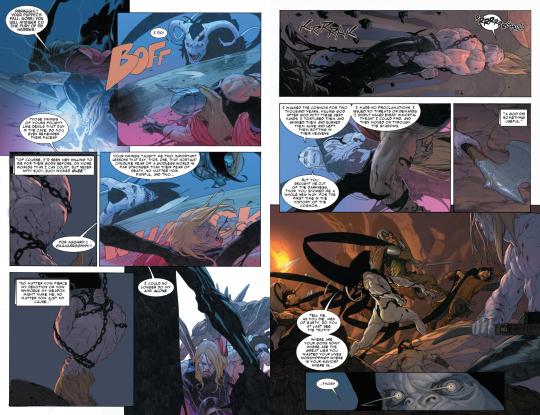
Here’s are the pages crossing between past Thor’s showdown with Gorr post rescue, and present Thor putting up with Gorr’s evil plan exposition dump. The explanation provided doesn’t really explain why we should blame Thor for Gorr’s current actions. It just adds up to “I was killing a lot of God’s, but then Thor almost stopped me, so I realised I had to kill even more and also create a crazy evil master plan”. So we’re meant to blame past Thor for, what, not checking for a body? Can we really expect a viking in 893 A.D. to be genre savvy? It seems Aaron is building up to past Thor having committed some kind of shocking “Original Sin” (haha), but all that foreshadowing doesn’t amount to anything. Except...
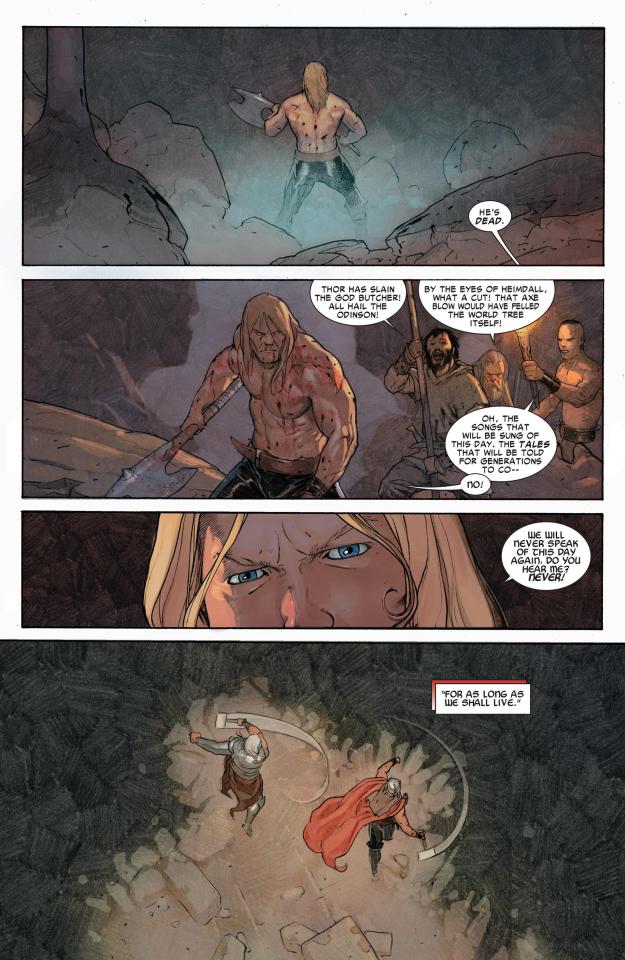
And so we finally see Thor’s infamous pride surface. He demands that “we will never speak of this day again.” At first this confused me, due to the lack of direct explanation for what exactly he wished to keep secret. But I guess he just doesn’t want word getting out that he was defeated and held prisoner?
Now, it’s always tricky when you get the feeling that your preconceived notions of a text have influenced your reaction, positive or negative. In this case, I know that nu Thor is coming. I know that original flavour Thor is going to be deemed unworthy and lose Mjölnir. The specifics, I have no idea of. But I was expecting Aaron to begin seeding this development with some hints as to Thor’s flaws, flaws which could easily be consistent with many prior characterisations. And he really does’t. Even when past Thor appears next to Thors 2 and 3 in the second arc through timey wimey machinations, he isn’t characterised as stupid or arrogant as he has been by other writers. He’s just a little more rash, and his no holds barred heroics even come off kind of cool?

I mean, space shark!
Unfortunately, I think that by not following through on his setup for past Thor Aaron severely limits the potential for Gorr the God Butcher, who could have been a great new villain in an era where such creations are in short supply. Villains are almost always more effective when their point of view has a twisted (or even perfectly sensible) logic to it. If past Thor had done something actually heinous than Gorr might have a decent reason for wanting all God’s extinct. I hate to sound like too much of a backseat writer when I should be discussing what’s on the page instead of what’s not. There just seems to be a lot of missed potential here.
Gorr’s grand motivations provide the main thematic backbone of the text. He hails from a barren, perhaps post apocalyptic planet where he and his tribe struggle to survive. He loses his mother to predators, his partner dies while pregnant with one of his children, and he struggles to provide for his remaining children. All the while, his culture demands complete fealty to their pantheon. The fact that Gorr’s people often sacrifice what little resources they have as offerings to these God’s angers him, when no matter how much anyone prays the call never seems to be answered. Eventually Gorr is abandoned by his tribe for being a heretic, and just as he resigns himself to death he encounters cosmic beings locked in combat. After stealing the power of one of these beings he takes to the stars and goes about killing Gods, convinced that they do the universe more harm than good.
It’s certainly interesting that during issue 1 the reader is introduced to present Thor in a sequence that reverses this story. On a similarly barren planet, albeit one where the resident culture is without belief God, a thirsty child prays to any God’s out there in the universe to bring rain. Thor, hearing the prayer, provides amply in an heroic act. This alien species also provides a striking resemblance to Gorr’s.
So, two conflicting stories with conflicting morals. Gorr’s story will jive well with an atheist outlook, while Thor’s story will seem ridiculous. But Thor is a comic about God’s, and thus it’s going to be about faith, and every comic that truly works with the character is going to be directly addressing this issue and either asking the reader to believe or question. Here, Aaron seems to be asking us to believe, if not in an ultimate God, then in Thor the comic character. Thor, who even in his supposedly most flawed incarnation is heroic and fair. Thor, who answers a child’s prayer from across the universe. Thor, who will fight for Asgard until the end of time.
Gorr’s story ends when it becomes clear that, by destroying all God’s, he has become a de facto God himself. Ever in denial, the only way he can admit this obvious fact is through a family created from his powers, seemingly built from different aspects of his psyche. Aaron telegraphs Gorr’s fate as the “God of Hypocrisy” early on, and while the reveal might have been a cute twist in a 2 or 3 issue story, as the conclusion to 11 chapters of build up it feels too convenient as a way to quickly justify Gorr’s defeat.
So, rather then providing a deconstruction of the Thor character, these issues of God of Thunder seem to instead be a celebration of the character in a few of his different configurations. The fact that Aaron consistently rejects or fails to address criticisms of the character, after decades of post Watchmen comics deconstructing iconic heroes, could almost be said to be a fresh subversion in itself. And yet it can’t help but feel slight, because it’s a story missing a serious dramatic arc for its hero. I’m still excited to see what Aaron does with Thor next, but I hope he does get around to properly testing his protagonist.
1 note
·
View note
Text
Wonder Woman Review SPOILER WARNING
Short Version Stand Alone Score 9/10 Universe Score 7/10 For more information continue reading. So, as a stand alone movie this is nearly perfect. Once the double twist happens it really lessens due to both a lack of foreshadowing and excess foreshadowing. The final battle is the weakest part of the movie by far. But before we get there, let's start at the beginning. Okay, so remember Captain America The First Avenger? Or Thor? Because this movie is basically those two films in a blender. Every scene of Themyscira is almost a direct analog to a scene from Thor. We've got Parent telling story of their history that also sets up exposition for the events we're about to see. (Substitute Ares the God of War every time Odin mentions the Frost Giants/Godkiller sword for the Casket of the Ancient Winters) We've got the scene of normal life until something major happens leading into a fight scene which ends up making the main character head to the mortal world. Now Captain America, we've got the wraparound story being in the present, and despite being WWI in this movie it still makes Germany out to be the out and out bad guys instead of the grey morality that the actual War had. You've got an unbelievably diverse group of ragtag soldiers that serve as backup to our hero. Basically when Diana isn't on screen it's basically Captain America 1, even the ending, where a guy named Steve ends up destroying a plane he's flying and being presumed dead. (Although in this movie the death is real.) And the villain(s) are terrible. Ares is a secret villain (It's Lupin) the guy Diana thinks is Ares is basically protoHitler, and the poison girl doesn't actually do anything. Also Ares goes full Enchantress at the end, he has seemingly endless powers yet despite Diana consistently saying she won't follow him he never just kills her, and then she just kills him. He has maybe 5 full minutes of villain screen time. Maybe more, the final boss fight really felt rushed compared to the great pacing of the rest of the film so it might've been longer after all it's a 2 1/2 hour film. Now let's get into continuity snarls. In Batman V Superman Diana said she gave up on humanity and stopped fighting for years. The ending of this movie leaves it more ambiguous in case they want a sequel in WWII I guess, like she has a speech about how the world needs more love and that she's seen the good and bad in every person, but she doesn't seem as disgusted with humanity as she did before the Doomsday stuff. Also, my biggest question in the movie is Why is Diana in Paris? There's no reason given in the movie for Diana to be in Paris. She's not there on Bruce's orders, because she seems surprised when he mails her something. If they don't explain what she was doing in Justice League then this movie is just a random world tour Diana decided to take for literally no reason. The seeming lack in continuity for a shared universe matters to me, because if you can't keep characters plots/arcs/details consistent from different director to director then it's not a good universe. If this is your only DCEU film then I'd say there's not much your missing. The only thing being that Bruce says the pic is the real thing because they only had the digital file before. Other than that it's completely stand alone. So as a stand alone 9/10 as part of the DCEU it's only a 7, making it basically an 8 overall. It's not my favorite movie of the year, but I really did enjoy it.
#wonder woman#wonder woman spoilers#overall for the year i'd say fifth favorite so far#behind power rangers get out guardians 2 and lego batman#i may have complained a lot#but that's because i enjoy during question after and a few days later i just enjoy all the good
0 notes